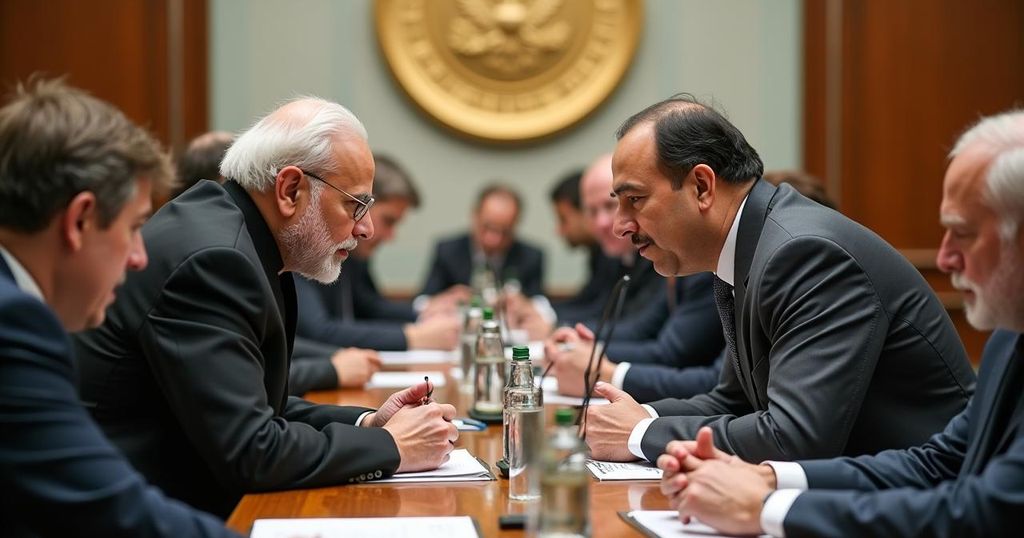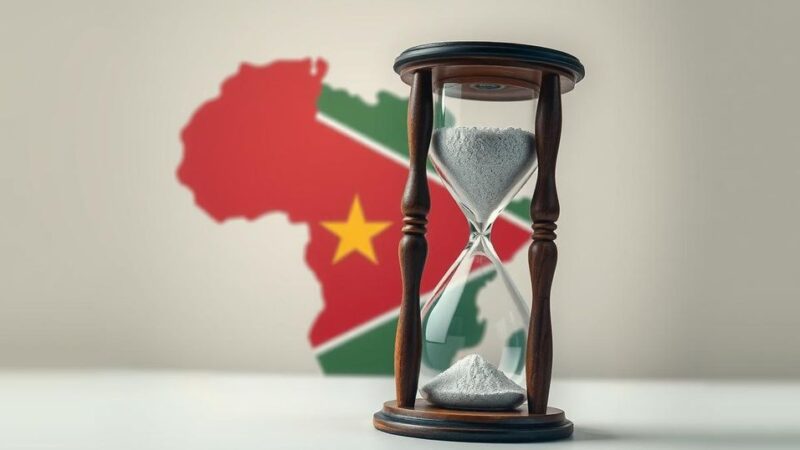Neither India nor Pakistan has requested a bilateral meeting during the SCO summit in Islamabad, as confirmed by Pakistan’s Foreign Minister Ishaq Dar. The event marks a significant gathering but is marred by political unrest and security concerns in Pakistan. Attention is focused on Mr. Jaishankar’s visit, especially the potential for discussions with Chinese leaders prior to the BRICS summit. Political tensions within Pakistan and the lack of optimism for India-Pakistan dialogue are significant themes in the lead-up to this event.
Neither India nor Pakistan has sought to engage in a bilateral meeting during the upcoming Shanghai Cooperation Organisation (SCO) Heads of Government summit, according to details shared by Pakistan’s Foreign Minister, Ishaq Dar. This statement precedes the arrival of External Affairs Minister S. Jaishankar in Islamabad, scheduled for October 15-16. Mr. Dar emphasized that the Pakistani government intends to extend full diplomatic protocol to Mr. Jaishankar as a gesture of hospitality, aligning with Pakistan’s duty as a host. This follows Mr. Jaishankar’s assertion from the previous week regarding his participation as a dedicated SCO member. While Mr. Jaishankar and representatives from the ten-member SCO, including notable attendees such as Iran’s Vice-President Mohammadreza Aref and Premiers from Belarus, Kazakhstan, Kyrgyzstan, Tajikistan, and Uzbekistan, will arrive on Tuesday, Russian Prime Minister Mikhail Mishustin and Chinese Premier Li Qiang are set to arrive a day earlier for their separate diplomatic engagements with the Pakistani leadership. The Ministry of External Affairs (MEA) has not disclosed specific bilateral discussions that Mr. Jaishankar might undertake during his visit, though significant anticipation surrounds the possibility of a meeting with the Chinese leader, ahead of the forthcoming BRICS summit in Russia from October 22 to 24, where Indian Prime Minister Narendra Modi and Chinese President Xi Jinping are expected to meet amid ongoing military tensions at the Line of Actual Control. Given the lack of expectations for an India-Pakistan meeting, experts have downplayed the potential effects of Mr. Jaishankar’s upcoming visit on the already tenuous bilateral relations. Notably, the last visit by an Indian Foreign Minister occurred nearly a decade ago in 2015 when Sushma Swaraj attended a conference in Pakistan that also included a bilateral meeting and a brief revival of the Comprehensive Bilateral Dialogue, which was subsequently stalled following the Pathankot terror attacks. Mr. Dar reiterated that neither India nor Pakistan had initiated requests for bilateral discussions, stating, “India’s Foreign Minister has not asked for any meeting, and we haven’t requested a bilateral meeting either. He will come as a guest for the SCO, and discussions will be held on multilateral issues.” He highlighted that this SCO summit marks a significant multilateral event in Pakistan, the first of its kind in almost three decades. While the possibility of reviving trade relations between India and Pakistan, which have been dormant since 2019, was raised earlier by Mr. Dar, no tangible progress has been made. He noted that discussions regarding projects such as the Turkmenistan-Pakistan-Afghanistan-India (TAPI) energy pipeline are occurring separately with certain SCO members but are not part of the SCO agenda. “But the mandate of the SCO will be multilateral, and the agenda is fixed,” he asserted. Security concerns have escalated as the opposition party, Pakistan Tehreek-e-Insaf (PTI), led by former Prime Minister Imran Khan, who is currently incarcerated, has announced protests in Islamabad on the same day as the SCO meeting. Anticipating unrest, authorities have deployed over 9,000 police personnel to maintain order, banning protests in several urban centers. Minister Ahsan Iqbal has suggested a nexus between India and PTI regarding these protests, without directly attributing actions to India, although the MEA has not formally responded to these allegations.
The article discusses the implications of the upcoming SCO Heads of Government summit in Islamabad, where neither India nor Pakistan has requested a bilateral meeting, reflecting broader geopolitical tensions. It highlights the backdrop of ongoing issues in U.S.-India-Pakistan relations, particularly related to trade and military standoffs. The political landscape in Pakistan, especially concerning former Prime Minister Imran Khan’s legal struggles and potential unrest, adds a layer of complexity to the event.
In summary, the upcoming SCO summit in Pakistan signifies a diplomatic engagement without the anticipated bilateral discussions between India and Pakistan. Acknowledging both parties have not sought meetings underscores the strained relationship amid longstanding issues. Additionally, the political unrest related to the opposition party, PTI, may overshadow the summit, revealing the intricate dynamics at play within the region at this crucial multilateral event.
Original Source: www.thehindu.com






